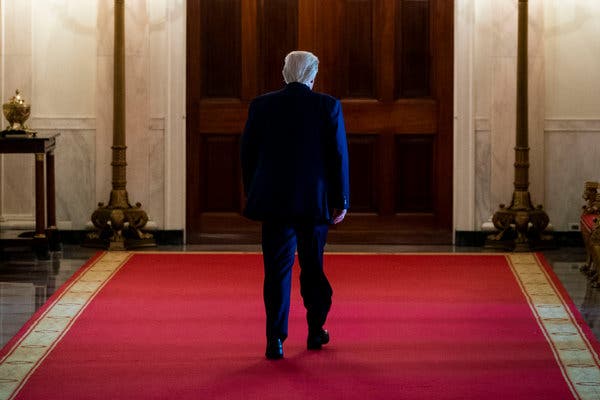Advertisement
News analysis
Caucusgoers, uniquely, will declare their loyalty before their friends and neighbors. And they are taking their responsibility very seriously.

CEDAR RAPIDS, Iowa — It is a public display of civic duty unique in American politics: Iowans on Monday night will stand in front of their neighbors and express their preference for a candidate for president. No curtains covering a voting machine. No private paper ballots. Just a declaration of loyalty before fellow Democrats.
The Iowa caucuses are at once both quaint and globally significant, with a singular power to elevate, or deflate, candidacies. But for all of their idiosyncrasies, perhaps their most distinctive element is the sheer transparency they provide to the selection process.
At a time of such political polarization, underpinned by anxiety among Iowa Democrats that they will elevate a nominee unable to defeat President Trump, the public nature of the caucuses has amplified the stakes. In interviews with scores of Iowans over the last three months, many expressed ambivalence about making a choice, desperately trying to assess what kind of candidate others might want to elect. Many appeared wary of picking sides, and risking fragmentation, at the expense of presenting a united front; they vowed to support the eventual nominee no matter what.
Some caucusgoers said, tellingly, that they were eager to knock doors for candidates they supported but preferred to do so in nearby towns or counties lest they alienate their neighbors.
“The idea is that the caucuses are this very romantic Jeffersonian thing, with neighbors gathering in small groups to discuss ideas and candidates, and help choose leadership that will organize volunteers and lead us to electoral victory,” said Nathan Thompson, the Democratic chairman in Winneshiek County. “Well, in reality, it can be a very frustrating and divisive thing for all of these volunteers and attendees.”
It is another complicating factor in a race full of them.
Even elected officials are trying to divine the best approach. Rob Sand, the state auditor and a rising star in the Democratic Party, said he planned to caucus for “uncommitted,” a category for those who do not want to align themselves with a candidate. Or he may not caucus at all.
“Ultimately, many of us will have a nominee who was not our first choice — we are going to have to put that aside and do our duty to help that nominee win,” Mr. Sand said. “So, I’m planning to set aside my own ability to make a choice to be a voice for unity.”
As the caucuses loom, Iowa Democrats are preparing to make what may be their most significant decision ever, one that could set the party on a path to ousting Mr. Trump from the White House or divide it further. And rarely has the outcome of the caucuses been so difficult to predict or so highly anticipated.
“Anything can happen here,” said David Axelrod, a former top adviser to President Barack Obama. “There’s growing clarity — but there’s not a lot of clarity.”
Adding to the sense of uncertainty, both the progressive and moderate wings of the party have taken turns asserting their dominance. All four of the leading candidates — Senators Bernie Sanders and Elizabeth Warren, former Vice President Joseph R. Biden Jr., and Pete Buttigieg, the former mayor of South Bend, Ind., — have led polls here in recent months. Another challenger, Senator Amy Klobuchar of Minnesota, has edged closer but not yet close enough.
Most recently, Mr. Sanders has appeared to open up a lead in Iowa, consolidating liberal backing as more moderate candidates in the race continue to split their support. A nascent attempt by moderate Democrats at thwarting his rise before it is too late has shown signs of backfiring. Mr. Sanders’s campaign raised more than $1 million off a negative ad last week that targeted him by name.
Iowa is already on tenterhooks. For months, it has defended itself against criticism that it is too white, its caucuses too exclusionary, to have the privilege of being the first state in the nominating process. Candidates have questioned the state’s leadoff position in the calendar. Across the state, Iowans are wary that the absence of a clean victory could muddle the choice for Democrats in other states and undermine Iowa’s claim to serving as a springboard to the nomination.
“I do think the Iowa caucuses might come to an end, especially if the results are indecisive,” said John Grennan, the Democratic chairman in Poweshiek County. “2016 was very messy. 2020 could be, too.”
Yet the race’s prevailing uncertainty has not stopped strategists, campaign aides and caucusgoers from prognosticating that has grown more frenetic as the Iowa contest approaches. It is a parlor game that has been rendered even more difficult by a complex new set of caucus rules.
For the first time, the Iowa Democratic Party will report, on a rolling basis, three numbers on caucus night — a delegate count and the amount of support on both the first and second rounds, known as alignments — leaving open the possibility that more than one candidate could claim victory.
What if Mr. Sanders receives the most support on the first alignment but another candidate wins on the delegate count? What if the top candidates are clustered together, separated by only a few percentage points? Such inconclusive results would make it difficult for any candidate to ride unrivaled momentum into New Hampshire one week later. And should voters remain as undecided in New Hampshire as in Iowa, Democrats could be staring at an extended primary fight that could leave everyone bruised.
For Democrats hoping for a clearer picture after Monday’s caucuses, it could lead to more hand-wringing and division. Candidates have already begun attacking their rivals in a bid for dominance.
Some campaigns have provided clues as to how they will assess the results on caucus night. Senior advisers to Mr. Sanders have indicated the Sanders campaign will declare victory if Mr. Sanders gets the most support on the first alignment. Aides to Mr. Buttigieg, on the other hand, are focusing on the delegate count. The Iowa Democratic Party and other party officials have encouraged the news media to report the delegate count, as has traditionally been done.
With so many undecided caucusgoers, the results could come down to how well organized campaigns are, particularly at the precinct level, where the final persuading will take place. Some campaigns have put in place precinct teams to persuade and wrangle caucusgoers before and after the first alignment. Precinct captains will be in touch constantly with their campaign headquarters for directives on their strategy inside the room.
Among caucusgoers, the persistent discussion of statewide political angst has only produced more angst. The degree of uncertainty, lingering even at this final stage of the precaucus season, has confounded some Democratic officials.
“Most people are undecided, and not only are they undecided but they’re considering staying undecided on caucus night,” said Judy Downs, the executive director of the Polk County Democrats. “Considering the sheer number of candidates and length of the campaign season, I didn’t think we would be in this position so close.”
Lisa Lerer contributed reporting from Des Moines, and Reid Epstein from Coralville, Iowa.
-
- Four sets of results will be reported from the caucuses, so how will the actual Iowa winner be chosen? Here’s what you should know.
-
- Bernie Sanders has gained substantial ground in recent weeks, nipping at Joe Biden’s national lead and raising huge sums. Here’s our polling tracker.
-
- Learn more about the top-polling Democratic presidential contenders.
-



